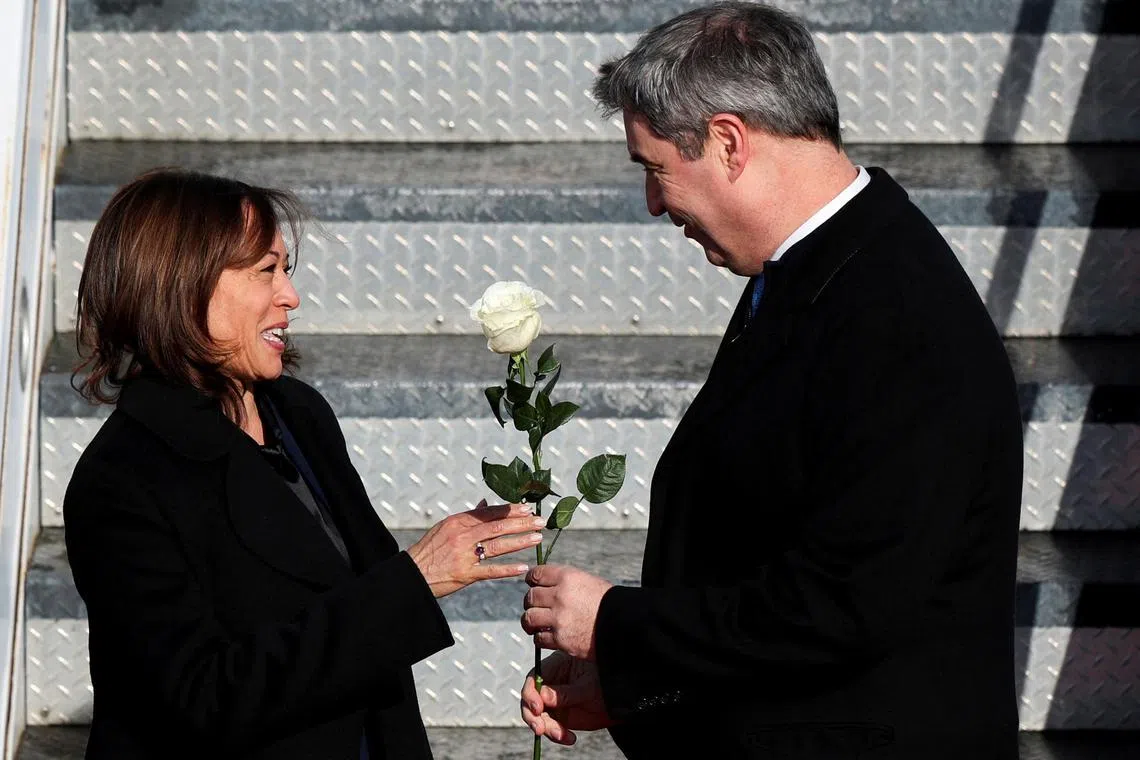At Munich security conference, western officials hope to show resolve ahead of Ukraine anniversary
Sign up now: Get ST's newsletters delivered to your inbox

US Vice President Kamala Harris (left) is welcomed at Munich's airport by Bavarian state premier Markus Soeder on Feb 16, 2023.
PHOTO: REUTERS
Follow topic:
MUNICH - Last year, mere days before Russia’s invasion of Ukraine,
Ukraine’s president Volodymyr Zelensky attended in person and chastised the West for failing to deter Russian aggression over many years.
This year, as officials including US Vice-President Kamala Harris
Friday is the first day of the annual three-day Munich Security Conference, attended each year by hundreds of government officials and intelligence, diplomacy and security elites. Run by a German non-profit company, the forum has taken on a quasi-official nature as top world leaders speak publicly and huddle privately on collective security issues.
Ukraine is sure to be the main topic this year, as Western officials are intent on showing President Vladimir Putin of Russia that he cannot divide the West. Ms Harris, who will deliver a speech on Saturday, is expected to reiterate the Biden administration’s commitment to defending Ukraine for “as long as it takes”, as President Joe Biden has said.
“My guess is that the mood will be one of unity and determination,” said Mr Ivo Daalder, a former US ambassador to Nato and president of the Chicago Council on Global Affairs. He said Western leaders see little prospect for worthwhile peace talks unless Ukraine can achieve more territorial gains.
In a likely preview of US messaging at the event, Ms Karen Donfried, the assistant secretary of state for European and Eurasian affairs, told reporters in a Wednesday briefing that the Western coalition had dashed Putin’s hopes of swift victory.
“Putin thought he would break the West and roll over Ukraine. He was wrong,” Ms Donfried said. “One year on, our commitment has not waned.”
The conference is held at the Hotel Bayerischer Hof in downtown Munich, and features public speeches, panels, as well as numerous private meetings, official and unofficial. Mr Daalder jokingly said the conference involves “a kind of speed dating for diplomats”.
Several prominent heads of state are expected to attend the conference, including President Emmanuel Macron of France, Chancellor Olaf Scholz of Germany, and Prime Minister Rishi Sunak of Britain.
Mr Biden attended the conference as vice president and as a private citizen during the Trump administration, but has dispatched Harris each of the past two years. Mr Biden will be travelling to Warsaw, Poland, on Monday as part of a three-day visit to observe the war’s anniversary.
A main event of the Munich conference will be remarks by Mr Wang Yi, China’s top foreign policy official,
Chinese state media has portrayed Wang’s presence at the Munich Security Conference as a sign of China’s moderating influence in a forum that would otherwise be dominated by US interests.
“The outside world has noticed that the United States and Nato want to turn the Munich Security Conference into a self-talking, self-fulfilling internal meeting of the Western world,” read an editorial published in the Global Times on Thursday, which accused Washington of fuelling Russia’s war in Ukraine, and depicted Beijing and Europe as both wanting a peace agreement.
“No matter how the United States sow discord, China and Europe have broad convergence of interests. It is an objective reality that cannot be changed or avoided,” the editorial continued. NYTIMES

